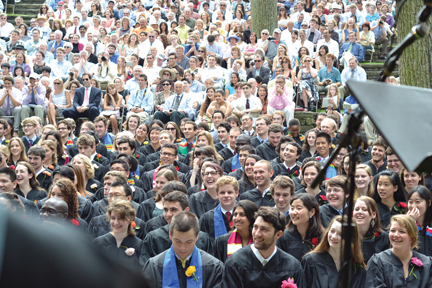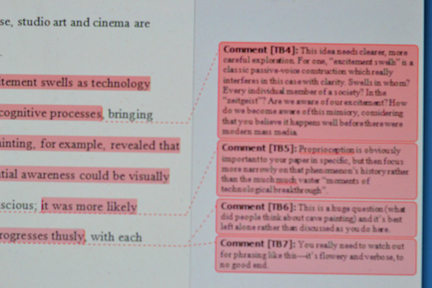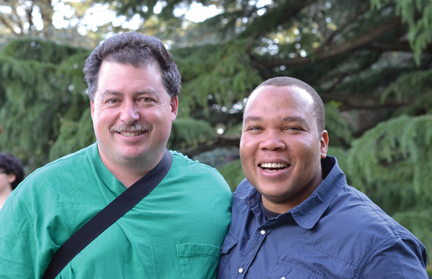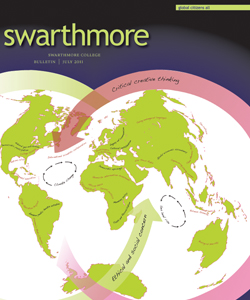Pictures from an Institution
Timothy Burke, professor of history and blogger at Easily Distracted, has a new project—to post and write about pictures from a year at Swarthmore, beginning with 2011’s Commencement. Here’s an excerpt.
GRADUATION Swarthmore’s graduation ceremonies strike me as very earnest and suited to the institution. They’re fairly low-key, relatively intimate, and focused very much on our own community. We rarely invite speakers with no previous connection to the College. I generally enjoy going to Commencement and have rarely missed it.
Swarthmore’s graduation ceremonies strike me as very earnest and suited to the institution. They’re fairly low-key, relatively intimate, and focused very much on our own community. We rarely invite speakers with no previous connection to the College. I generally enjoy going to Commencement and have rarely missed it.
Many of Swarthmore’s faculty attend year after year, and that’s a reflection of the degree to which most of us feel a strong responsibility to and for the institution. In institutions where most faculty do not attend, I think that is probably a sign that the ceremonies themselves may need some redesign and that the institutional culture has strayed towards an impersonal, consumerist delivery of services. If a college or university (and its faculty) make exalted claims about the culture and community of higher education, then that ought to extend into a sense of commitment to the rituals that sustain those claims.
GRADING
 I’ve been slowly shifting over to paperless grading. I have enough of an attachment to marking a printed paper that I still sometimes mark the paper once, loosely, by hand and then copy over comments to a digital copy. The digital mark-up has some advantages beyond allowing potentially for paperless exchanges. Most usefully, it means I retain a copy of the paper with my comments, which comes in very handy when I have to write recommendations, do advising for the student, or otherwise need a track record of their past work for me. Grading is as much of a chore for me as it is for most academics. It is interesting to think about why it’s easily the most hated part of the job.
I’ve been slowly shifting over to paperless grading. I have enough of an attachment to marking a printed paper that I still sometimes mark the paper once, loosely, by hand and then copy over comments to a digital copy. The digital mark-up has some advantages beyond allowing potentially for paperless exchanges. Most usefully, it means I retain a copy of the paper with my comments, which comes in very handy when I have to write recommendations, do advising for the student, or otherwise need a track record of their past work for me. Grading is as much of a chore for me as it is for most academics. It is interesting to think about why it’s easily the most hated part of the job.
For one, at least in the humanities and soft social sciences, it’s all too easy to be aware of how arbitrary and fine-shaded the distinction between grades can be. I tend to agonize a lot over the difference between A- and B+, since I regard both of those as strong grades designating good work. A clear A is usually easier to recognize, and grades below a B- tend to involve either serious problems with the quality of the work or other considerations such as late or missing work, which is also a lot easier to discern.
Another issue is that when you have a larger group of assignments to grade, the common or repeated patterns and issues tend to get mind-numbing after a while. I have to keep reminding myself not to punish whomever I’m grading near the end simply for the bad luck of reading something I’ve seen before.

Burke (left, with former student Chandiwana Sithole ’97) has been sharing his “jackdaw perspective on culture, politics, academia, and other shiny objects” in monthly postings to his blog Easily Distracted since 2005.
ALUMNI
Meeting with alumni doesn’t feel like work. Sometimes it’s about seeing old friends, sometimes it’s more like meeting distant relatives that you’ve never seen before but with whom you share all sorts of surprising and subtle connections. Alumni who were at the College before I started working here often begin a conversation with me by working up to my arrival via the lineage of history faculty that they knew and took classes with, the same way you’d place a distant cousin by working out who the relatives were that you both know. Seeing your own former students, spread out over an increasingly long period of time, is really the most powerful way to get a sense of the consequences of your own decisions as a teacher, to see what value you add or fall short of achieving.
But making connections between faculty and alumni is work, work of the very best kind, best because it’s easy and pleasurable and enlightening. Especially for small colleges, information technology is making it possible to sustain a link between the classes being taught today, the students admitted, and the diverse careers and life situations of the alumni. I’m getting increasingly excited by some of the possibilities: Alumni are the first, best public for academia and the natural sounding board for working out its future.
 Email This Page
Email This Page